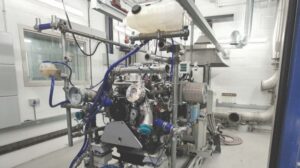Hydrogen power is slowly but surely emerging onto the motorsport scene. This year, we have already seen hydrogen race cars enter the Fuji 24 Hours, hillclimbs and the Dakar Rally, while 2025 brings with it the world’s first hydrogen championship in the form of Extreme H, and by 2027 hydrogen prototypes are expected to race at the Le Mans 24 Hours.
So why are teams shifting toward hydrogen? Which technology is most suited for motorsport – hydrogen fuel cells or hydrogen combustion? Technical experts at Ricardo explain.
The benefits of hydrogen power
As an alternative to fossil fuels, hydrogen ticks many boxes. It is the most abundant element in the universe, releases approximately three times more energy per unit weight than the likes of gasoline [1] and when used to power vehicles, only emits water and heat.
“Hydrogen engine efficiency is similar to conventional combustion engines,” highlights Richard Osborne, global technical expert – Sustainable Engines at Ricardo. “Hydrogen fuel cells achieve higher efficiencies at low-load operating conditions. At high loads however, considering overall traction efficiency, fuel cells and hydrogen engines are very similar.”
“However, the most important advantage of hydrogen is that there are no carbon emissions at the tailpipe,” continues Osborne. “Even sustainable liquid fuels, which can be carbon neutral on an overall lifecycle basis, still produce CO2 at the tailpipe. That’s why hydrogen is seen as a key alternative.”
How does hydrogen combustion work?
Just like a conventional internal combustion engine, hydrogen combustion uses a spark ignition engine to burn a fuel and air mixture which drives reciprocating pistons to generate mechanical power. However, liquid or gaseous hydrogen fuel is used instead of liquid fossil fuels such as gasoline or diesel.

“Hydrogen is a great fuel for combustion because it has high flame speeds and fast combustion which is ideal for motorsport applications,” explains Osborne. “It also has a very broad flammability range which means you can run a wide range of air fuel ratios. It requires slightly different materials and compression ratios, but otherwise most of the mechanical, injection and emission systems are very similar to conventional ICEs.”
How does a hydrogen fuel cell work?
A hydrogen fuel cell is similar to a battery and consists of an electrolyte, an anode and a cathode. Liquid or gaseous hydrogen fuel is supplied to the anode and air is supplied to the cathode. At the anode, a catalyst separates hydrogen molecules into protons and electrons, which take different routes to the cathode. The protons pass through the electrolyte, while the electrons flow through an electrical circuit. Once at the cathode, the electrons and protons combine with the oxygen from the air supply, producing water and heat.
“Hydrogen fuel cell vehicles retain an electric powertrain so will still have inverters providing AC power to motors that drive the wheels through a transmission,” says Temoc Rodriguez, global technical expert – Electrified Solutions at Ricardo. “But the power is generated by the stacks within the hydrogen fuel cell, instead of a battery.”
However, batteries or supercapacitors still have an important role to play. The fast accelerations and decelerations in racing demand energy to be quickly discharged. Unfortunately, fuel cells cannot react this fast because they are limited by the speed of the chemical reactions within the stacks.

“Fuel cells cannot split the electrons from the hydrogen molecules fast enough for motorsport,” continues Rodriguez. “It can take a fuel cell 2-3 seconds to go from 0% to 100% power capacity, yet a race car needs to accelerate from 0 to maximum speed within 2 to 3 seconds. So that peak power must come from another energy storage system such as a battery or a supercapacitor.”
This is why hydrogen fuel cells are typically combined with a battery or supercapacitor. The former provides a consistent background level of power, while the latter delivers the instantaneous power required for the quick transients during acceleration and braking.
The challenges of storing hydrogen on a race car
Hydrogen is the lightest gas in the universe, so its energy density per unit weight is extremely high. However, its high expansion ratio means its energy density per unit volume is extremely poor. This makes storing hydrogen in tanks on a vehicle a major challenge.
“Liquid hydrocarbons are pretty much unbeatable in terms of their energy density per unit volume, so any alternatives such as batteries or gaseous fuels struggle to compete,” says Osborne. “For example, compressed hydrogen gas occupies around 12 times the volume, and liquid hydrogen around six times the volume as gasoline having the same energy.”
Today, the majority of hydrogen fuel cells store hydrogen gas at 400 bar, with newer vehicles achieving up to 700 bar. However, hydrogen gas occupies around two times more volume than it does in its liquid state [2], so could liquid hydrogen be the answer?
“This is one of the biggest challenges with fuel cells – how much hydrogen can you realistically store on board?” highlights Rodriguez. “Using liquid hydrogen instead of gas could help store around 100% more hydrogen, but that comes with its own challenges. Liquid hydrogen needs to be kept at cryogenic temperatures and has to be boiled off before it can be used in the fuel cell. This requires more equipment in the pipeline which then increases the overall volume and mass of the vehicle.”
“Another way of storing hydrogen, that is currently being researched, is to use solid hydrogen,” continues Rodriguez. “The hydrogen is chemically mixed with a hydride molecule and stored as a solid which achieves similar volumetric densities as liquid hydrogen but without the complexities of maintaining cryogenic temperatures. A heating element in the tanks heats the solid, releasing hydrogen gas which can then be used in the stacks.”
Is hydrogen a good solution for motorsport?
There are no silver bullets in engineering, so as with any emerging technology, there are pros and cons to using hydrogen in motorsport.
From a performance perspective, there is minimal difference between a hydrogen combustion race car and a hydrogen fuel cell race car out on track. Although fuel cells are typically suited to lower load applications, integrating a battery or supercapacitor makes the overall hydrogen fuel cell package just as competitive as hydrogen combustion.
“There is also a weight advantage compared to fully electric race cars,” says Rodriguez. “Battery packs remain heavy which curtails acceleration. Whereas a hydrogen fuel cell, combined with a small capacitor bank, brings the base weight of the car down, so the car can accelerate faster for a similar power capacity, which could lead to more overtaking.”
This fuel cell and supercapacitor/battery architecture also introduces a strategic element to the races. Similar to energy management in Formula E, teams will need to balance the energy from the fuel cell with the energy from the supercapacitor/battery and optimize this blend for each circuit.
“Another benefit of hydrogen power, particularly for combustion, is noise,” says Osborne. “Fans continue to criticize the lack of noise from hybrid and electric championships, but hydrogen combustion race cars emit the same sound as conventional ICEs.”
“You can also refuel much faster than you can recharge a battery,” continues Osborne. “Of course, there are challenges around ensuring the safety of refueling hydrogen, but the technology is available, it’s just a case of integrating it into a pitstop scenario.”
Conclusion
Overall, whether it is a fuel cell or combustion, hydrogen can be an effective alternative to fossil fuels in motorsport. The key is to ensure that the hydrogen comes from truly sustainable sources and that the regulations push the boundaries of storage, to encourage suppliers to really drive innovation.
“In motorsport, new technologies are seen as a challenge, not a restriction,” concludes Stuart Cooper, market head of motorsport for Ricardo. “Racing provides a great platform to problem solve new technologies in a competitive environment that’s interesting to spectators.”
“That’s why Ricardo is heavily involved in hydrogen discussions with the FIA and ACO as well as hydrogen projects in many other sectors,” continues Cooper. “We have invested in test, manufacturing, assembly and simulation facilities to develop hydrogen powertrains, whether that be for combustion or fuel cells. There’s no faster way to drive development then by integrating it into a motorsport championship and we’re ready to support customers to do just that.”
To speak to an expert at Ricardo, click here.
This article was originally published on the Ricardo website.
Credit: Ricardo and Gemma Hatton
References
[1] All About Hydrogen [Online]. IFP Energies Nouvelles.
[2] 2001. Module 1: Hydrogen Properties [Online]. Department of energy.


